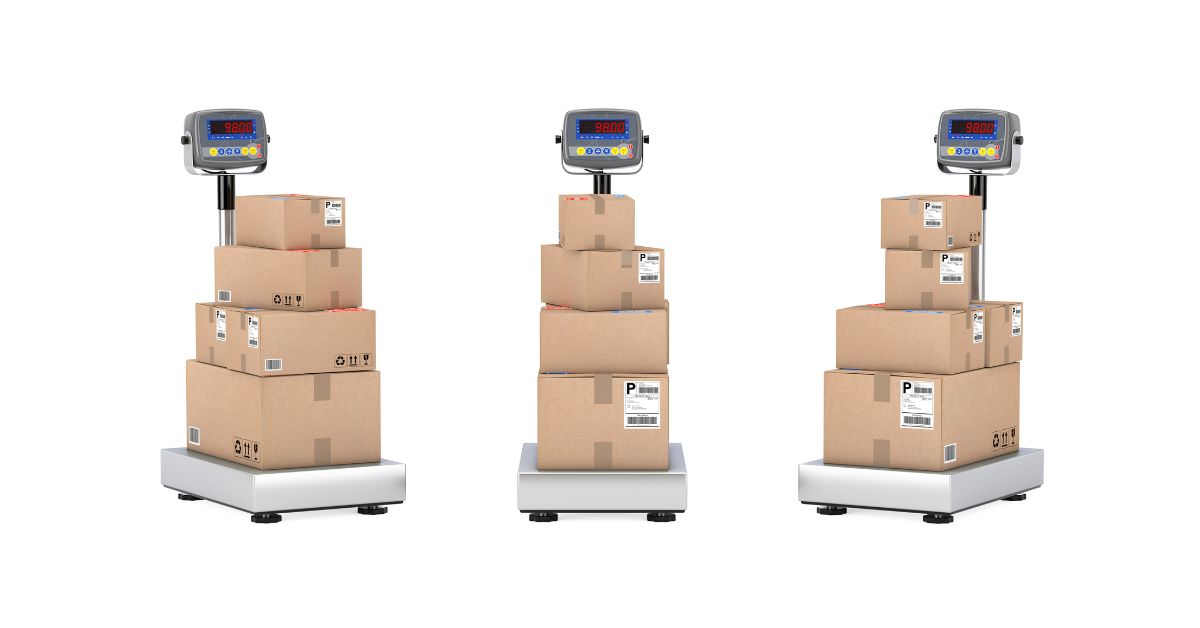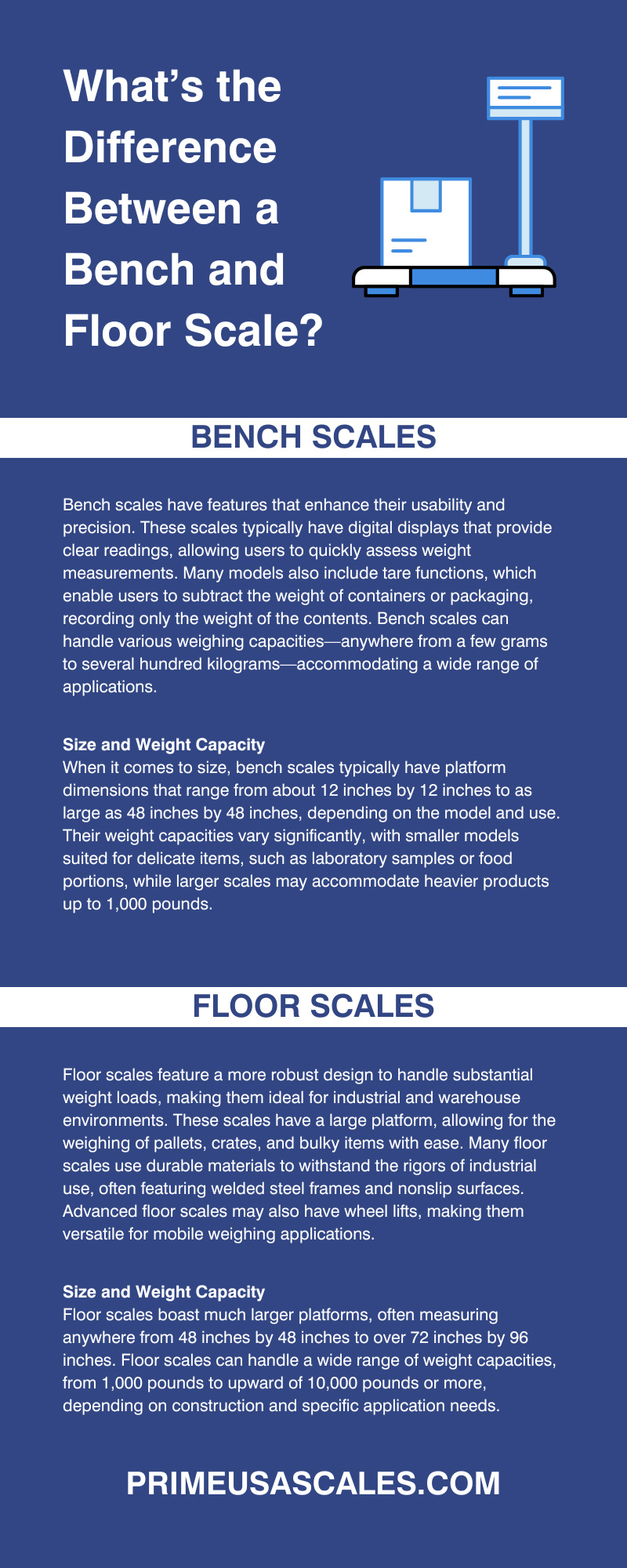
In the industrial and commercial sectors, weighing equipment plays a crucial role in ensuring operational efficiency, product quality, and safety standards. Whether in manufacturing, logistics, or retail, the ability to accurately measure weight is essential for not only meeting regulatory requirements but also for optimizing operational productivity and ensuring product integrity.
The choice of scale can profoundly influence accuracy and usability in various settings. Bench and floor scales are two of the most prevalent types of weighing equipment employed across various sectors, tailored for specific use.
Each has unique features, advantages, and limitations that cater to different needs and circumstances. This guide will clarify the differences between bench and floor scales, providing insights to help you make an informed choice based on the specific requirements of your operations.
Definition of Bench and Floor Scales
Bench scales have features that enhance their usability and precision. These scales typically have digital displays that provide clear readings, allowing users to quickly assess weight measurements. Many models also include tare functions, which enable users to subtract the weight of containers or packaging, recording only the weight of the contents. Bench scales can handle various weighing capacities—anywhere from a few grams to several hundred kilograms—accommodating a wide range of applications.
Floor scales feature a more robust design to handle substantial weight loads, making them ideal for industrial and warehouse environments. These scales have a large platform, allowing for the weighing of pallets, crates, and bulky items with ease. Many floor scales use durable materials to withstand the rigors of industrial use, often featuring welded steel frames and nonslip surfaces. Advanced floor scales may also have wheel lifts, making them versatile for mobile weighing applications.
Size and Weight Capacity
When it comes to size, bench scales typically have platform dimensions that range from about 12 inches by 12 inches to as large as 48 inches by 48 inches, depending on the model and use. Their weight capacities vary significantly, with smaller models suited for delicate items, such as laboratory samples or food portions, while larger scales may accommodate heavier products up to 1,000 pounds.
Floor scales boast much larger platforms, often measuring anywhere from 48 inches by 48 inches to over 72 inches by 96 inches. Floor scales can handle a wide range of weight capacities, from 1,000 pounds to upward of 10,000 pounds or more, depending on construction and specific application needs.
Portability and Setup
When considering portability, bench scales tend to be more lightweight and easier to transport than floor scales. This portability makes them suitable for use in multiple locations within a facility or for mobility in various job sites.
Floor scales are heavier and may require permanent installation or specific setup due to their size and construction. This distinction affects how easily each type of scale can move and the adaptability to changing work situations.
Precision and Calibration
The precision of bench scales is due to their sensitive load cells and advanced digital measurement systems, which can yield measurements accurate to within a fraction of a gram. This high degree of accuracy is crucial in applications such as pharmaceuticals and scientific research, where exact weights can directly impact results and outcomes.
Floor scales use algorithms that compensate for varying floor conditions and environmental factors, such as temperature fluctuations and vibrations. This capability helps maintain accuracy in dynamic settings where conditions may change frequently.
Construction and Durability
The construction of bench and floor scales shows significant differences, particularly in their durability. Bench scales may feature lighter materials, such as plastic and stainless steel, designed for frequent use but not heavy loading.
Floor scales can endure the rigors of industrial environments, featuring robust steel frames and durable platforms that can withstand heavy impacts and corrosive substances. These characteristics make them suitable for harsher conditions.
Cost Considerations
One of the main differences between bench and floor scales is their price. Bench scales, generally available at a lower price point, can vary their prices depending on the features and precision required. Their affordability makes them an attractive option for small businesses, laboratories, and retail operations that do not require heavy-duty weighing solutions.
While the initial expense of floor scales is higher, they are more cost effective in high-volume environments. Their ability to handle large quantities and weights means businesses can ultimately save on labor and time by reducing the need for multiple scales or frequent weight transfers.
Ease of Use and Readability
The user experience is critical when it comes to scales, as it directly affects efficiency and accuracy in weighing operations. Bench scales have more straightforward functionalities with intuitive controls and larger, backlit LCD displays that ensure visibility in various lighting conditions. Some models even include touch-screen interfaces for enhanced interaction and additional features like data storage and retrieval.
Floor scales have large, easy-to-read displays that users can position at an optimal height, reducing the strain of bending down during the weighing process. Some advanced floor scales feature wireless connectivity to remote displays or mobile devices, allowing operators to monitor weight readings from a distance.
Maintenance Requirements
For bench scales, routine maintenance involves cleaning the scale’s surface with appropriate mild detergents and avoiding harsh chemicals that could corrode materials. Always inspect the power supply and connections for any signs of wear or damage. Calibration is crucial at least once a year, or more frequently if the scale is subject to heavy use or environmental changes.
Floor scales require a bit more diligence in terms of maintenance, especially because of their heavy-duty applications. In addition to regular cleaning to remove debris and corrosive substances, you should frequently check for any physical damage to the scale’s platform or frame, as even minor impacts can affect accuracy. Calibration is essential following manufacturer guidelines, with certified weights used to ensure compliance.
Choosing the Right Scale for Your Needs
When deciding between a bench and a floor scale, evaluate your specific weighing requirements, including capacity, environment, and frequency of use. For operations that demand portability and precision for lighter items, quality industrial tabletop scales may be the right choice.
For industries handling bulk materials, a floor scale will provide the durability and capacity necessary for efficient operations. Understanding your needs is key to selecting the right weighing solution that ensures accuracy, reliability, and operational success.
Both bench and floor scales serve critical roles in various industrial and commercial settings. While they differ in size, capacity, construction, and applications, the ultimate choice will depend on the specific requirements of your operations. By carefully considering the features and intended uses of each type, you can select the scale that best meets your needs.
Call us today and explore our large selection of quality scales. Invest in equipment that will cover your needs and help your business thrive in a competitive market.
